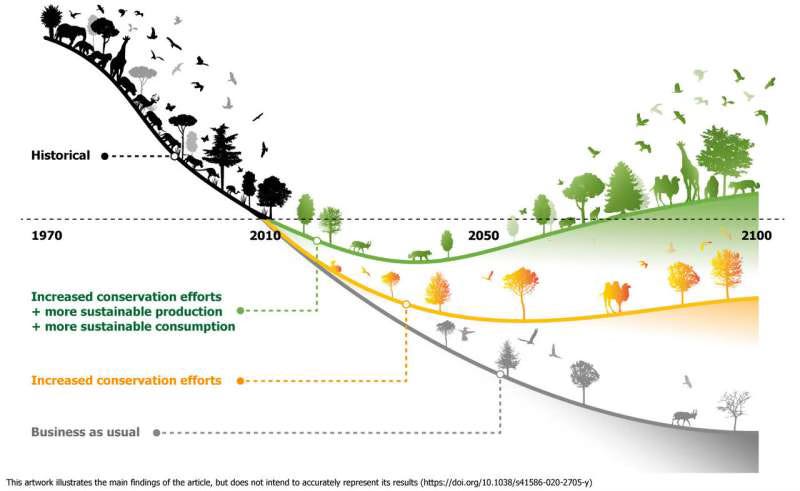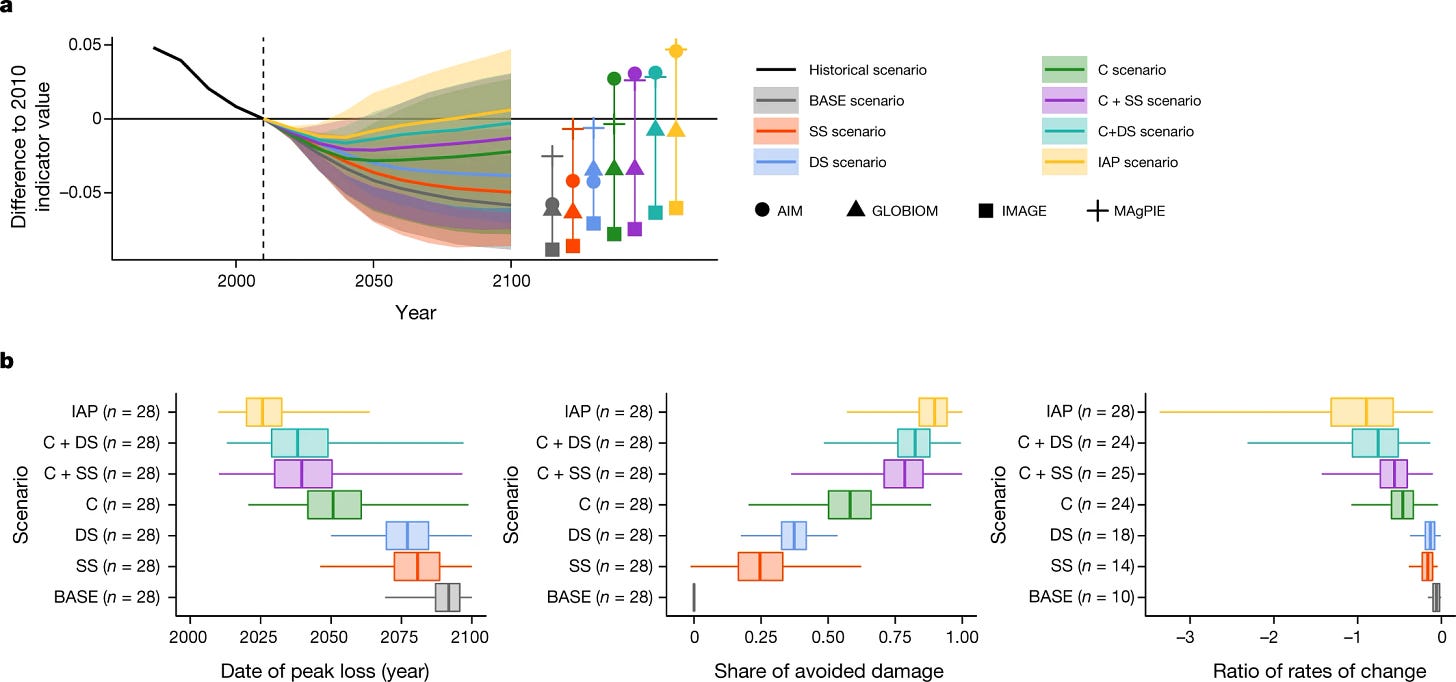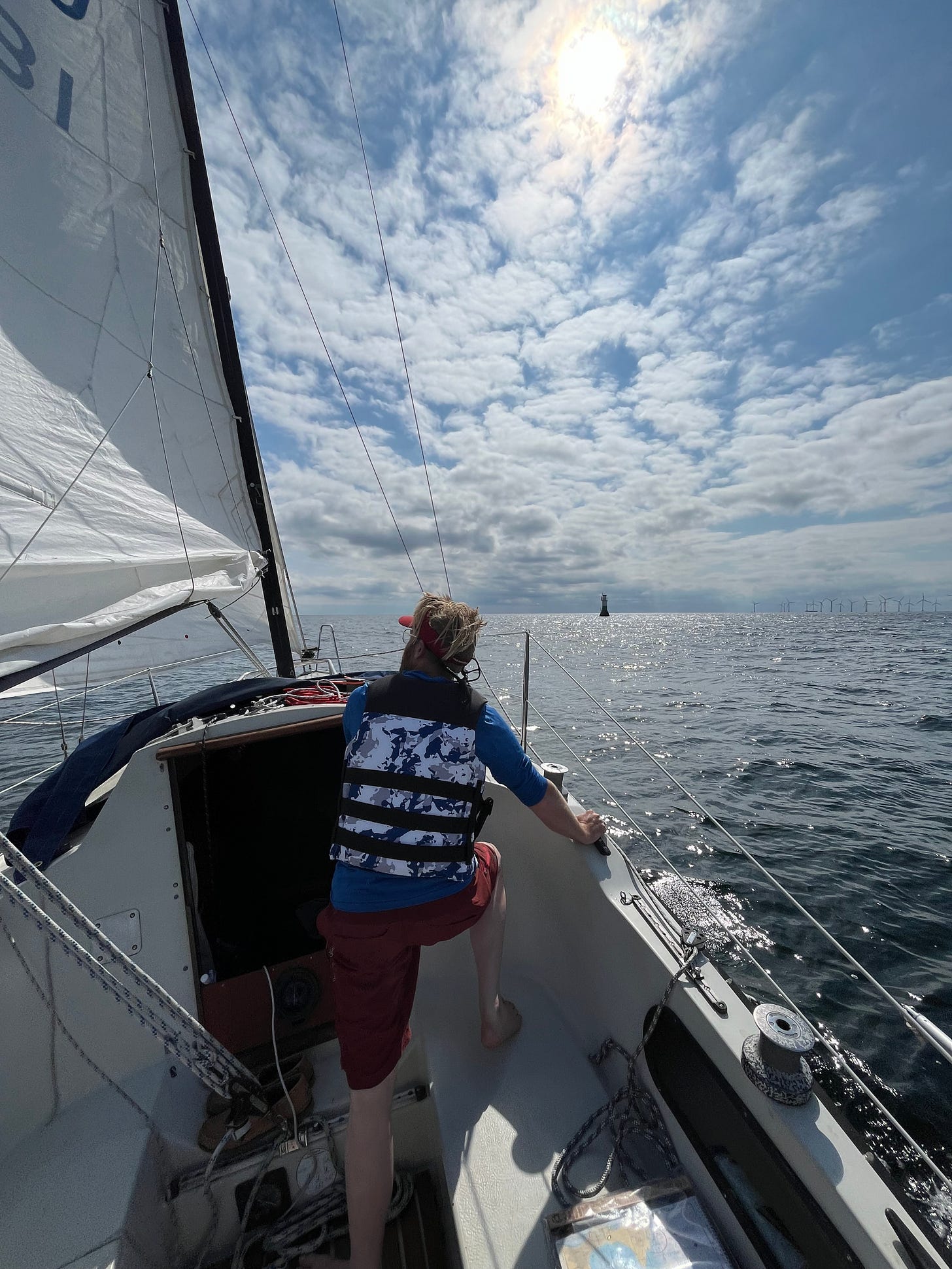Climate Citizens, Unite!
Facts: How to save life on earth 🐸 🐘 🌴| Feelings: Embrace half-heartedness 🌗 | Action: Climate citizens, unite!
How to seize the climate moment in the biggest election year on Earth; we know what it takes to reverse biodiversity loss; being a “half-hearted fanatic” for climate
Hi friends!
I’m slowly adjusting to sitting in front of a keyboard again, after a glorious summer of sailing, paddling, swimming, reading, and talking to old friends around a campfire. Very happy to report I’m at 871 hours outside so far in 2024, which has done wonders for my soul. You can join the challenge to spend 1,000 hours in a year outside at any time, as my friend Emily just did!
I’m still finding my way amidst a tough year personally, but I’m grateful to report my health is much better, and I feel my cup is filled and I have some energy to give.
I hope you got to spend time with loved ones and with beautiful nature this summer!
As all the Swedish signs say, “Finally, back to the everyday,” so here comes your monthly dose of facts, feelings, and action for facing the climate crisis together with our lovely We Can Fix It community and me, your trusty climate scientist!
Facts: How to Save Life on Earth
I’m working on a new project I’m excited about. Here’s a sneak peek. I hope you enjoy!
Reading the news about precipitous declines in species and ecosystems feels overwhelming. Humans are rapidly wiping out life on Earth. Humanity has cleared almost 40% of forests globally. Only 15% of the original biomass of all wild land mammals remains.
But! The destructive trends don’t have to continue.
We know how to save biodiversity.
A study led by David Leclère found that we can stop worsening the ongoing trend of global biodiversity loss by doing three things:
Increase conservation with land protection and management;
Restore degraded land; and
Plan for conservation across landscapes to connect and increase ecosystem resilience.
These three strategies together will prevent about half of future biodiversity loss (yellow line below).

To actually reverse biodiversity loss (green line above), Leclère and colleagues found we’ll have to do three more things:
Cut food waste in half throughout the supply chain globally;
Eat more plant-based diets in areas where meat consumption is too high for health and environmental sustainability, like the US and Europe, where animal product consumption should be cut in half; and
Increase agricultural productivity per unit of land, and increase trade to get food from where it’s best produced to the people who need it.
Land conservation & plant-based diets are most effective
Of these six measures to restore life on Earth, by far the most effective was conservation. Better protecting and managing land (Measure #1) was about five times more effective for reversing biodiversity loss than the supply-side measures of increasing agricultural intensification plus trade (Measure #6).
News flash: Starting at the root to prevent problems is much more effective than treating their symptoms!
The typical focus is on increasing production, but demand-side solutions are far more effective. (In a study I coauthored analyzing over 12,000 studies on how to feed the world, we found three-quarters of the literature focused on increasing food production, while only a quarter focused on right-sizing demand per capita).
Combining demand-side solutions by halving food waste (#4) + halving animal consumption with more plant-based diets (#5) was twice as effective to reverse biodiversity loss as the supply-side solutions to increase yields + trade (#6).

Overall, reversing biodiversity loss and rebuilding the ecosystems and communities where plants and animals can thrive is possible- and essential.
More good news— we also know what land to protect, and it’s concentrated in a few areas. Maybe I’l write more about that soon. :)
Feelings: Embrace Half-Heartedness
I’ve been talking with friends about a new feeling I’m experiencing. Belinda calls it “mediocrity is the goal.” Denise calls it “not resisting a new chapter.” Rahul calls it “half-heartedness,” after the Edward Abbey quote below:
“Do not burn yourselves out. Be as I am - a reluctant enthusiast....a part-time crusader, a half-hearted fanatic. Save the other half of yourselves and your lives for pleasure and adventure. It is not enough to fight for the land; it is even more important to enjoy it. While you can. While it’s still here. So get out there and hunt and fish and mess around with your friends, ramble out yonder and explore the forests, climb the mountains, bag the peaks, run the rivers, breathe deep of that yet sweet and lucid air, sit quietly for a while and contemplate the precious stillness, the lovely, mysterious, and awesome space. Enjoy yourselves, keep your brain in your head and your head firmly attached to the body, the body active and alive, and I promise you this much; I promise you this one sweet victory over our enemies, over those desk-bound men and women with their hearts in a safe deposit box, and their eyes hypnotized by desk calculators. I promise you this; You will outlive the bastards.”
-Edward Abbey, Desert Solitaire
I have many friends currently in the depths of or slowly recovering from burnout. (I wrote about addressing the root causes of burnout a couple years ago). Working for climate is tough. At our work kickoff last week, our director said, “Our normal job can suck the life out of us.” We have to resist that life-sucking spiral.
This idea of setting limits on even urgent and important work, to have time and energy to prioritize health and relationships, pleasure and adventure, and ultimately stay in this work for the long haul is resonating with me right now.
What do you think?
P.S. On the other hand, Derrick Jensen wrote that he “always kind of hated [this Abbey] quote.”
Action: Climate Citizens, Unite!
As you know from the Choose Your Own Adventure Climate Action Guide, if you live in a democracy, your most powerful climate superpowers are as a citizen.
And 2024 is a BIG year for climate citizens.
According to the United Nations Development Programme:
This is the biggest election year in human history. Half of the world’s population – some 3.7 billion people – will have the opportunity to go to the polls in 72 countries.
Here are some of your top actions as a climate citizen. Please roll up your sleeves and get to work!
Your #1 climate action as a citizen is to vote for leaders who'll make and implement strong climate policies.
Your vote can have up to 3x the climate impact of your carbon footprint, based on the policies your elected officials enact.
There are important climate policy issues on every ballot, in national, regional, and local elections.
To vote for climate:
Make sure you're registered to vote in your next election. If not, sign up at a trusted government website (like this one, to Register to vote in the US) or from searching "register to vote" + "[name of my country]".
After you've registered to vote, note on your calendar the date of upcoming elections, and set a reminder to vote. Find upcoming elections in the US (the general election is November 5, 2024).
Be sure to vote in primaries and local elections as well as national elections.
How can you find politicians committed to real climate action?
Elect politicians with good climate voting scores from organizations like LCV in the US or the Climate Action Network in Europe.
If your candidate doesn't have a score--vote for candidates who have pledged not to take fossil fuel money.
Check who funds your candidate (hint: big fossil fuel companies are not great for ambitious climate policy).
And please, for lots of reasons including the climate, elect more women! A 2019 study showed more women in parliament resulted in lower national carbon emissions via stronger climate policies.
Give time and money to climate politics organizations
A study led by Seth Wynes on the climate impact of voting had some important tips:
If you have money to spend on climate action, don’t buy offsets. Donate it to politicians running on a strong climate platform, especially supporting scrappy challengers against incumbents with a bad climate voting record early in the election cycle in close races.
A good option for non-wonks who don’t follow every race is “giving to organizations who aim to elect climate-concerned legislators and relying on their expertise to allocate funding.”
Wherever you give, openly discussing your contributions is important, because research shows this type of giving is contagious.
Here are a few great climate-focused organizations that could really use your support to help elect climate champions:
“The Environmental Voter Project identifies millions of non-voting environmentalists and turns them into consistent voters.” The group estimates that 13,000,000 environmentalists don’t vote in federal US elections. Mobilizing this group who already cares about climate to vote their values is incredibly powerful. (Every US Presidential election since 1984 has been decided by fewer votes than that.) They’re looking for volunteers to call potential voters, send postcards, or knock on doors to mobilize these inactive environmental voters.
Climate Power’s communications are “localizing and personalizing the impacts of climate progress being made right now — from local hiring, to lowered energy bills, to cleaner air and water”. They have helpful resources for key swing states on how to talk to voters about the benefits of current climate policies, as well as how climate impacts are harming local people and places.
Climate Cabinet helps “high impact leaders run, win, and legislate on climate change.” They score US state legislators for their climate and environmental justice records, and focus on the “500,000 state and local elected officials [who] control 75% of US emissions.” You can donate to support the “downballot races with the biggest climate impact.”
I’d love to hear about your favorite climate policy organizations and how you’ve been involved- especially those beyond the US. What organizations have you supported and why? Please let me know in the comments below!
Parting Tidbits
Upcoming talks, come see me here:
I’ll be lecturing on effective personal climate action at Lomma Library at 18:30 on September 4. Welcome to join!
Recent podcast:
Just two Swedes chatting climate— here’s me in conversation with Tarzan (Alexander Skarsgård) on how to get beyond analysis paralysis and focus on what choices really matter for climate.
Book Recommendation
Into the Clear Blue Sky: The Path for Restoring our Atmosphere, by Rob Jackson. I heard Rob give an inspiring seminar at Stanford about his “crazy dream”— that humanity should not just stop climate getting worse, but actually restore it to its full pre-industrial splendor. In this book he shares his vision for moving from “climate despair to repair.”
Thanks for reading!
xo,
Kim





Thank you for this! Voting in my particular area is so discouraging, but I keep plugging away at every election no matter how small. I will check out these links for how to help mobilize voters!
Hello! Great that you are back! I was surprised not to see any mention of indigenous communities role in conservation. Considering 80% of biodiversity is protected by indigenous communities I would have thought that empowerment would be one of the major levers.
https://www.worldbank.org/en/news/feature/2023/08/09/empowering-indigenous-peoples-to-protect-forests#:~:text=About%2036%25%20of%20remaining%20intact,those%20on%20non%2DIndigenous%20lands.